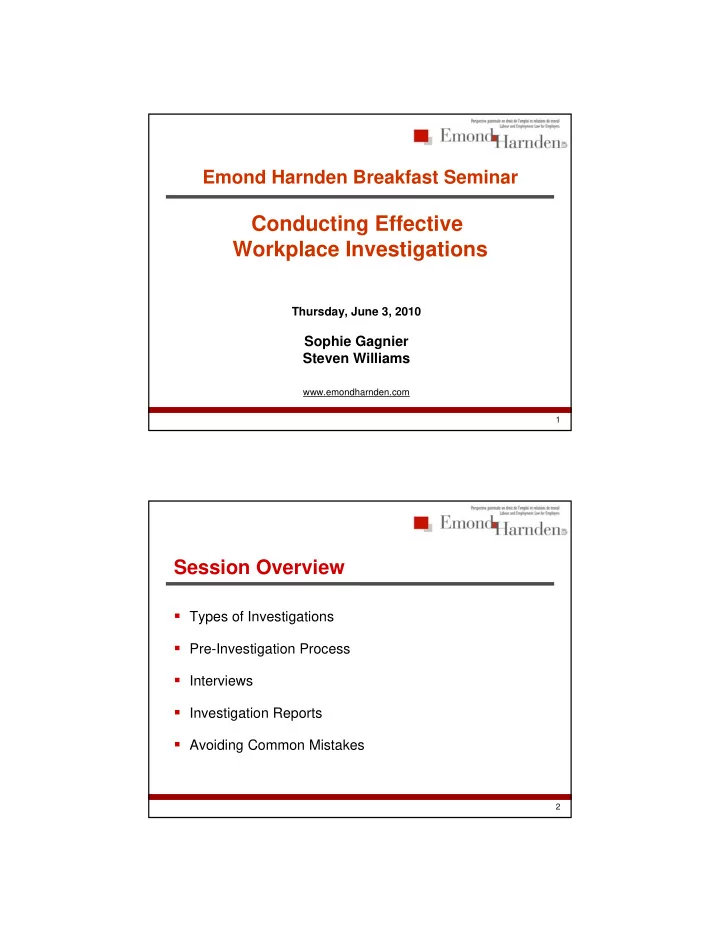

Emond Harnden Breakfast Seminar Conducting Effective Workplace Investigations Thursday, June 3, 2010 Sophie Gagnier Steven Williams www.emondharnden.com 1 Session Overview Types of Investigations Pre-Investigation Process Interviews Investigation Reports Avoiding Common Mistakes 2
GTAA v. P.S.A.C. (2010) “…since the GTAA's conduct in both its investigation and also in its ultimate determination was not only unreasonable but also in bad faith, the Grievor is entitled to an appropriate remedy including damages.” Awarded more than $500,000 in damages 3 Roe v. Schneider National Carriers (2006) “…the employer should afford an employee a meaningful opportunity to respond to allegations of misconduct and should conduct a reasonable investigation in order to successfully raise such conduct in support of a just cause dismissal.” 4
Negligent Investigation An employee can sue for a negligent investigation Liability? Private investigation firm hired by employer – YES Against employers – NOT YET 5 Types of Investigations Just Cause Investigations Human Rights Investigations Personal Harassment Investigations Workplace Injury Investigations Violence Investigations (Bill 168) 6
Pre-Investigation Process Receive complaint – incident occurs Timing issues Interim measures 7 Pre-Investigation Process Suspension with pay Transfer Change reporting relationships Leave of absence 8
Pre-Investigation Process Disclosure of allegations to respondent Fact-finding – gather documentary and witness evidence Confidentiality 9 Dealing with Represented Parties Lawyer Union Support person Procedural fairness 10
Selecting Investigators Neutral Qualified Internal vs External 11 Interviewing Parties and Witnesses Order of interviews Be prepared Private location Cover ground rules 12
Interviewing Parties and Witnesses Convey seriousness of interview Watch tone Be neutral Don’t interrupt the flow of narrative 13 Interviewing Parties and Witnesses Take time, be patient Take notes! Written summary from witness Ensure accurate, thorough information 14
Interview Questions Break the ice Seek specific information – W5 Invite a narrative – chronological works well Lead with open questions Clarify with specific questions 15 Types of Questions Credibility questions Solicit other relevant information Be careful of leading questions 16
Wrapping up the Interview Review notes Any questions/additions? Follow-up Confidentiality reminder 17 Confidentiality X recognizes the Complainant’s and the Respondent’s interest in confidentiality. To protect the interests of the Complainant, the Respondent and any others who may report or be witnesses to such incidents, confidentiality will be maintained throughout the investigatory process to the extent practicable and appropriate under the circumstances. Only those with a need to know about the complaint will be made aware that an investigation is ongoing. The results of any investigation will also be kept confidential and will be disclosed to individuals only on a need to know basis. 18
Obtaining Other Evidence Retrieve quickly! Secure any relevant documents Expert documentation analysis Taking a view Photos/diagrams 19 Reviewing the Evidence Standard of proof Create a chronological summary of ALL evidence Assess credibility 20
The Investigation Report Contents Scope of Retainer Description of Complaint Description of Methodology Analysis of Evidence Recommendations Circulation Action 21 Contacting Police and/or Regulatory Body When? Continue with your investigation Results of police investigations 22
Common Mistakes 1. Failing to promptly investigate 2. Failing to provide procedural fairness 3. Failing to take complaint seriously 4. Choosing untrained investigators 5. Choosing internal over external 6. Failing to remain neutral 23 Common Mistakes 7. Failing to properly document 8. Failing to appreciate psychological dynamics 9. Mishandling reluctant complainants 10. Applying wrong standard of proof 11. Failing to advise of outcome 24
Common Mistakes 12. Failing to gather all relevant information 13. Failing to follow policy and procedure 25 Questions? 26
Recommend
More recommend